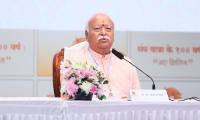Non governmental organisations seeking curbs on circulation of the Nanavati Commission report giving clean chit to Gujarat Chief Minister Narender Modi in the Godhra train carnage and subsequent riots got a setback as the Supreme Court on Monday disagreed that there was illegality in submitting an interim report.
"Prima facie there is no legal bar under the Commission of Inquiry Act to give interim report," a Bench headed by Chief Justice K G Balakrishnan said when senior advocate Rajender Sachar, appearing for petitioner NGOs -- Citizen for Justice and Peace and People's Union of Civil Liberty, questioned the submission of the report in parts.
The first part of the Nanavati Commission report, which was placed before the Gujarat Assembly on September 25, said the fire in the Sabarmati Express coach in Godhra was a conspiracy and not an accident.
Repeatedly making it clear to the NGOs that the law did not prohibit the submission of interim report or a report in part, the bench, also comprising Justices P Sathasivam and Aftab Alam, said, "In given circumstance giving interim report may have become imperative."
The bench also allayed the apprehension of the NGOs that it was not entertaining their contention by saying that it was not passing any order and would consider the plea on receiving the response of the Gujarat government after three weeks.
However, the apex court which on September 26 had rejected the plea of the NGOs to stay the printing and circulation of the report once again posed the same question to Sachar as to what was his apprehension if recommendations of the commission were implemented.
The senior advocate said millions of copies of the report will be circulated and it would lead to communal disharmony in the country.
He said that the report could influence the trial of the case.
Senior advocate Soli J Sorabji, appearing for the Gujarat government said there was no recommendation in the report for implementation.
He said he can even record a statement that the trial will not be influenced by the findings of the report.
The NGOs have contended that the publication of the report by the commission headed by Justice Nanavati, a retired
apex court judge, would provide a ground to the state government to take a liberal stand against the accused in the post-Godhra riots of 2002 that claimed over 1,000 lives.
While seeking a stay on the circulation of the report, the CJP, run by social activist Teesta Setalvad, had referred to another report on the incident prepared by a committee headed by Justice U C Banerjee, a retired Supreme Court judge.
The Justice Banerjee Committee set up by the Lalu Prasad-headed railway ministry had concluded that the burning of S-6 coach of Sabarmati Express at Godhra was purely an accident.
However, after the report was leaked the Gujarat high court had stayed the Banerjee Committee report.
Sachar said since the Banerjee Committee report has been stayed, the apex court should maintain parity and pass an
order to restrain the circulation and printing of the Justice Nanavati Committee report also.
This submission was opposed by the Gujarat government, which said that the high court has later quashed the Constitution of the committee to probe the incident and as such it has no legal sanctity.
The first part of the Nanavati Commission report, which was placed before the Gujarat Assembly on September 25 said the fire in the Sabarmati Express coach in Godhra was a conspiracy and not an accident, contradicting the findings of the Justice Banerjee Committee report.
The 168-page report of the commission said the burning of S-6 coach of Sabarmati Express on February 27, 2002, killing 58 'kar sevaks' was a pre-planned conspiracy hatched at Aman Guest house in Godhra.
"There is absolutely no evidence to show that either the chief minister or any of the ministers in his council or police officers had played any role in the Godhra incident," the report said.
"On the basis of the facts and circumstances proved by the evidence, the commission comes to the conclusion that burning of S-6 coach of the Sabarmati Express in which 'kar sevaks' coming from Ayodhya were killed was a pre-planned act," the report said.








